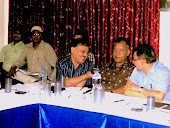Enforcement of laws to reform administration
A path to governance reform
(Published in Good Governance July-August 2004)
Bhim Upadhyaya
As is evident, prevalent corruptive attitudes and behaviors such as passivity, unaccountability, chaos, anarchy has crossed limits in Nepalese administration. Commission for Investigation of Abuse of Authority (CIAA) recently invited to its office for a meeting, the secretaries and the heads of government ministries and departments and directed them, as preventive and reformative measures, to prepare a standard doable manual for internal operation and method (O & M), to check corruptive and rampant tendencies like piling up of files, indecision, lack of sense of responsibility, confusion in jurisdiction and authority, red-tapism and process bottlenecking and in government offices to be effective from 17th July,2004. The chief commissioner as well as the chief secretary also confessed that similar directives prepared in the past were mostly the creation of the outsiders, be it domestic or expatriate consultants, without assessing the actual ecology and environment of the Nepalese bureaucracy. Since such manuals came in droves without the concerned officials' active participation, the major focus in general was to spend budget money anyhow. And those manuals could not be properly implemented for lack of the sense of ownership.
The ever-increasing trend of irregularities in government agencies and correcting them by the CIAA seems a perpetual daunting task altogether. Decentralization, transparency, rule of law, participation are prerequisite conditions for good governance. You cannot cook the food by heating spindle. It is always more economical, easier and more effective to take precautionary and preventive measures before any act of corruption or an irregularity takes place. Contrast as it appears, concerned agencies seem never to show ample seriousness in enforcing and monitoring of implementation of myriads of existing statutes, acts, rules and regulations, O & M, and procedural manuals. They showed interest only for hammering out new manuals for varying reasons. If past experiences are any indication, no one looks confident about implementability of such yet another procedural manual. No body knows how many volumes of such manuals would help establish good governance in Nepal.
Given the situation that it is almost impossible even to get legal duties carried out by government officials without bribing, you cannot imagine the amount of corruption involved for unlawful businesses in Nepalese administration. At a time where there is a complete absence of effective monitoring, supervision and check mechanism of government administration, this is only an obvious plight. The purpose of earning of black money by corruptive behavior lies always behind any illegal business .Why should one bother to monitor if there is money coming for prompt action, for delayed action and even for non-action? A lot of black money can be earned in case the nexus developed already is kept intact in the name of policy decisions or produce a reason as an alibi for mutually contradicting existing rules and regulations. It's not without reason that said the government agencies are the principal breachers of laws. As it is quite difficult to understand existing laws even to learned people how can it be taken for granted that the illiterate and common people can understand and take advantage such laws? In a situation where it is impossible to get work done without bribing even for lawful act, how can one imagine illegal act without huge kickbacks? There is obviously no urge in breaching the laws for an uncorrupt official. Transaction of government businesses following prevailing laws is the prime objective, duty and behavior of any government official.
A large number of acts, rules, and regulation in practice mandatory to be followed while conducting any government business. And a lots of other very useful rules and regulations have been already promulgated by the government as per the provision following the Administrative Procedural Act 1956 to be complied by all government officials for the better and effective transaction of government businesses. Likewise, hundreds of independent Development Committees have been set up in parallel to permanent departments and local bodies all over the kingdom to conduct similar development activities as per provision laid down in Development Committee Act 1956. All the government agencies including local bodies are compelled to comply with all hitherto promulgated legal provisions. But are they doing so in practice? It is a truism that the present chaos and disorder we are facing now is nothing but obvious outcome of the open breach of rule of law. Is it no bodies duty to monitor and examine this? do violators be granted impunity? Whose duty is this ? Of the concerned ministry in charge? Of the cabinet secretariat? Of the Ministry of Public Administration? Of the CIAA? Or whose? Laws cannot be executed without enforcing them. Laws do not have hands, legs, ears, eyes, and brain to be automatically active themselves. The problems created by being unable to enforce law cannot be solved by enacting yet another law. The only solution, therefore, is nothing but to create an atmosphere for the rule of law. No body should be in confusion that it is insufficiency of laws but many contradicting laws are a hindrance to rule of law and good governance.
HMG has allocated Rs 10 billion for district level development budget out of total Rs 42 billion national development outlay in the current fiscal year for development and construction works in village, urban and district levels. The Ministry of Local Development (MoLD) is apportioned a total of Rs 6 billion out of it. The total capital budget allocation in development for district level is only Rs 5.5 billion in this fiscal year. More than Rs 4 billion (approx 80%) of the total capital budget from district level national budget allocation set aside for local construction and development is dispersed directly through local bodies and agencies under the ministry of local development. Similarly, every year, thousands of millions of rupees are directly funneled to local bodies by bypassing government budget channel by foreign donor agencies.
Likewise INGOs are also implementing development programs worth billion though the domestic counterparts directly. Local bodies also mobilize as local revenues themselves amounting billions of rupees each year for local development activities. One can easily see that tens of billions of rupees is being spent at local levels without proper government control and regulatory mechanism. Every funding agency's programs are being implemented without any standardized and control-less manner each year by overtly violating the prevailing rules & regulations. There are separate rules and regulations being followed for each of government's, local bodies', donor agencies', NGOs' projects or works even for the identical local work activities which seem clearly contradicting to each other to villagers and thereby ever creating or encouraging anarchy and non-transparency in development procedures at local levels.
The present prevalent mass scale breach of laws in development and general administration is the outcome of culture of interpretation of legal provisions for selfish purpose rather than common peoples' interest, indiscriminate enactment of ever new laws and regulations designed to address immediate problems. The temptation and culture not following rule of law is being practised because one can exhibit his unlimited discretionary power to the common people. Decades have already past since the practice of regular monitoring, inspection, control, administrative auditing and assessment of procedural abidance in government offices has been non-functional. Given all these problems of chaos and anarchy, can the CIAA's instruction of preparing yet another O& M solve all these maladies? Is it possible to resolve these problems so long as there remains legal and administrative anarchy. The CIAA enthusiasm alone is not enough; the government machinery too must be equally serious and proactive and join hand in hand. The main responsibility of the CIAA is to take action against the public official who violate administrative legal provisions and lodge judicial cases in Special Court against those who are charged of alleged corruption and bribery. What CIAA should do is to be active in monitoring whether or not the public offices are sticking to prevailing legal processes or procedures. The CIAA must not waste its precious time in shouldering government's responsibility too as it is none of its business. To bring wrongdoers in for legal actions is more than enough to reduce evil activities. The honest staff must be taken into confidence, guarantee and encourage them to fight corruption and irregular activities from within. Too many laws and manuals won't do miracle to our ailing modality of governance. If we are really serious, we must correct legal anarchic laws first. What requires is eliminating contradictions in various prevailing laws Not by bringing into yet another additional bulk of rules and regulations, not t by bringing in additional legislation. Reducing number of such laws and, rendering immediate consolidation of various relevant laws into a single, timely, modern standard code of administrative procedural law. And such a consolidated and codified law undoubtably promote transparency, monitoring mechanism, control, inspection, supervision, evaluation and most importantly establishes long-sought rule of law. This is what seems a prime need to effect fresh administrative reform through good governance in Nepal. No more new laws are required, but proper enforcement of hitherto made laws matters more.







No comments:
Post a Comment